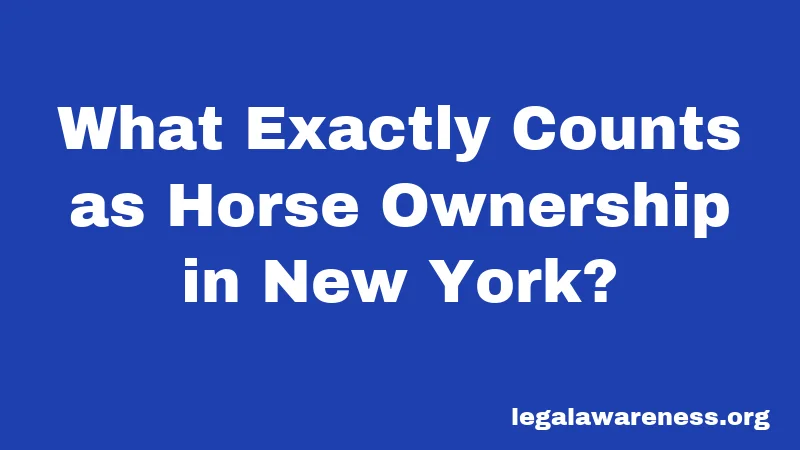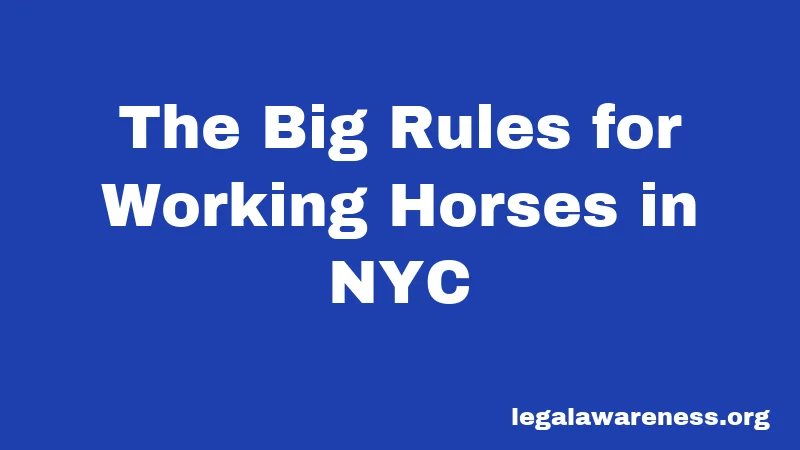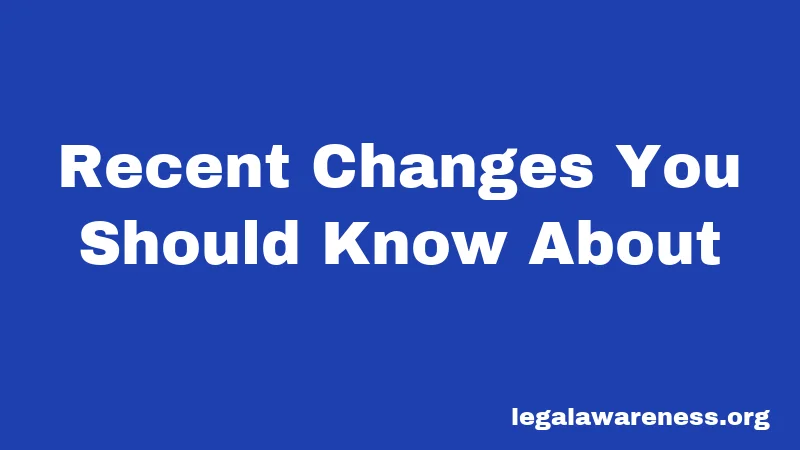New York Horse Laws in 2026: Everything Horse Owners Really Need to Know
Most people have no idea how strict New York’s horse laws actually are. Seriously. Whether you own a horse, ride one, or just keep one in your backyard, there are specific rules you need to follow. Breaking these laws can hit you with heavy fines or even jail time. Let’s walk through what you actually need to know.
Stay with me here. This matters more than you might think.
What Exactly Counts as Horse Ownership in New York?

Horses are special in New York. The state has unique rules about who can own them and how they must be cared for. Think of it this way. It’s similar to owning a business, but with a living creature that depends on you completely.
You don’t need to own property to keep a horse in New York. However, your horse must be properly stabled. That means safe, clean housing. If you want to build a stable on your property, check your local zoning laws first. Some neighborhoods won’t allow it.
Here’s the key thing. If you plan to work your horse for money (like giving riding lessons or operating a carriage), you need a special license. Horses kept purely as pets don’t require licensing. But if you’re using that horse for any kind of rental or paid work, the rules change dramatically.
Working Horses and Licensing Requirements
Okay, pause. Read this carefully. Working horses are treated differently under the law.
In New York City, any horse used for rides or carriage work must be licensed. The Department of Health and Mental Hygiene (DOHMH) handles these licenses. You’ll need to provide veterinary proof that your horse is healthy. This isn’t optional. It’s the law.
Here’s what you need to do. First, get a health certificate from a licensed New York State veterinarian. The certificate must confirm your horse is healthy and can work safely. Submit the original (not a copy) to the Office of Veterinary Public Health Services. Then pay the licensing fee.
Outside New York City, rules vary by county. Call your local health department to find out what’s required in your area. Different municipalities have different rules. This part can be tricky, honestly.
The Big Rules for Working Horses in NYC

Wondering if your horse can work unlimited hours? Nope.
Carriage horses cannot work more than nine hours in any 24-hour period. Riding horses cannot work more than eight hours in any 24-hour period. Your horse needs real breaks. These aren’t suggestions. These are hard legal limits.
Working horses must be at least five years old. They cannot be older than 26 years old. The state believes younger horses can’t handle the physical demands. And horses too old simply shouldn’t be working that hard. Makes sense, right?
Horses being used for work need veterinary exams every four to eight months. That’s in addition to the yearly exam. If a horse gets sick or injured while working, you must get veterinary care immediately. No exceptions. Allowing a limping horse to work without treatment is illegal.
Health and Animal Care Requirements
Here’s where things get serious. All horse owners in New York must maintain proof of rabies vaccination. This applies to every horse, whether it works or not. Police, health inspectors, or animal welfare officers can ask for proof at any time.
Your horse must have a stable with proper space. In New York City, stalls must be at least 60 square feet. The width must be at least 7 feet. Your horse needs to be able to turn around and lie down safely. A small stall can get you in real legal trouble.
Working horses must get five weeks of time off every year. This isn’t vacation for fun. It’s required by law. Your horse’s body needs rest.
You must provide clean water daily. Food must be good quality. The basic rule is simple. Give your horse what it needs to survive and be healthy. Neglect is a crime.
Recent Changes You Should Know About

New laws arrived in 2025 that affect horse owners. Pay attention here.
New York just banned the slaughter of horses for human consumption. It also bans the slaughter for animal feed or pet food. You cannot sell, transport, or possess horseflesh if you know it’s for human or animal consumption. Breaking this law gets you a fine up to $1,000 or jail time up to one year. For corporations, the first violation can be $5,000. Second and later violations jump to $25,000.
Race horses get extra protection. New York made it illegal to breed or sell race horses to slaughter. Trainers found doing this lose their stalls permanently at all New York racing tracks.
Racehorses must be microchipped now. This law helps track horses and protect them from dangerous situations.
Transportation and Travel Rules
Transporting horses on public roads? You need specific documents.
Any horse traveling on a public road must have a current negative test report for Equine Infectious Anemia (EIA). There are only three exceptions. One is if the horse is going directly to a livestock market as a green-tagged animal. Two is if it comes directly from an approved market with a pending test. Three is in emergency situations.
If you buy or sell horses, you’re officially an “animal dealer” under New York law. You must get a Domestic Animal Health Permit. This permit requires record keeping about every horse you buy or sell.
Not getting the right permits? You’re breaking the law. Penalties include fines and possible criminal charges.
The Rules About Horse Dealerships and Sales
This one surprises most people.
If you buy or sell more than a couple horses, you need a permit. You must keep detailed records. These records are subject to state inspection at any time.
Selling disabled horses is illegal. If a horse can’t work because of injury, disease, or lameness, you cannot sell it at an auction in New York. The penalty is a fine between $5 and $100, or jail time up to six months, or both.
Knowingly selling a horse with a contagious disease is a misdemeanor. You could face up to one year in jail and a $1,000 fine.
Animal Cruelty Laws: This Part Is Critical
Okay, this is important stuff. Really important.
It’s illegal to overdrive, torture, beat, or unnecessarily injure any horse. It’s also illegal to deprive a horse of necessary food, water, or medical care. Breaking this law gets you charged with a misdemeanor. The penalty is up to one year in jail and a $1,000 fine.
But wait, it gets more serious. “Aggravated cruelty” is a felony in New York. This means intentionally killing a horse or causing serious physical injury with extreme cruelty. The punishment is up to two years in prison. Killing a police work horse is a Class E felony with even harsher penalties.
The law defines cruelty broadly. It’s not just beating. Cruelty includes:
- Overworking a horse beyond its ability
- Failing to provide medical care for an injured horse
- Letting a horse suffer from untreated wounds or infections
- Forcing a horse to work when it’s lame or sick
- Not providing adequate food, water, or shelter
Courts have ruled that even allowing a horse with open sores to work for hire is torture and cruelty. Yes, that’s how strict it is.
Specific Rules About Horse Care
Different parts of New York have different rules about where you can keep horses. Zoning laws control this. Urban areas usually don’t allow it. Rural areas usually do. Check your town’s zoning before you bring a horse home.
Property setback requirements matter too. Your stable must be a certain distance from neighboring properties. This protects your neighbors. It also protects you legally.
Horses cannot be left untethered or unattended. They must be confined in a stable or proper enclosure. You need someone responsible watching them. This prevents accidents and injuries.
Horse Drawn Carriages: A Huge Update Coming
Hold on, this part is getting major changes.
New York is banning horse drawn cabs in New York City. Legislation passed in early 2025 will prohibit operating horse drawn carriages for hire in the city. When this law takes effect (expected within 180 days of signing), operating a carriage business becomes illegal.
Horses currently working in carriage services must be disposed of humanely. The law defines humane disposal carefully. You can sell or donate the horse to someone who promises to keep it only as a companion animal. You can donate it to an animal sanctuary or animal protection organization. The key requirement is proof that the horse will never work again and will be cared for for life.
This is a major shift in New York City law. If you operate or own a carriage horse, this affects you directly. Get legal advice about what to do with your horse.
What About Racing and Performance Horses?
Performance-enhancing drugs are illegal in horse racing. In 2025, New York strengthened this law significantly.
No substance that affects a horse’s nervous, cardiovascular, respiratory, digestive, urinary, or reproductive system can be used. Testing is strict. Violations result in penalties and horse suspension from racing.
A horse’s first violation means suspension for at least 180 days. A second violation means suspension for at least one year. A third or later violation means suspension for at least two years.
If you’re involved in racing, this is serious stuff. The state is cracking down hard on performance drugs.
Penalties and What They Mean
Let’s break down what happens when you break horse laws.
Basic cruelty charges get you up to one year in jail and $1,000 in fines. That’s a misdemeanor. Think of it like a traffic ticket, but more serious.
Aggravated cruelty is a felony. It’s less severe than major crimes, but still no joke. You face up to two years in prison. This goes on your permanent record.
Killing a police work horse? That’s a Class E felony. The penalties are harsher. You face real prison time.
Operating an unlicensed working horse can get you cited and fined. Your horse can be taken away. You can be ordered to stop immediately.
Failing to register as an animal dealer means fines and legal problems. The state takes record keeping seriously.
Special NYC Rules You Need to Know
New York City has extra rules beyond state law.
All licensed horse owners must allow veterinarian exams. Recently, the city issued an Executive Order requiring all carriage horse owners to permit veterinary examinations. This includes gait evaluation and bloodwork. Refusing is a violation.
If a horse is found unsuitable for work, it must be removed from work immediately. No excuses. No delays.
Health Code violations can mean notice of violation, orders to stop working your horse, or confiscation of your animal.
Horses must be properly shoed. Harnesses must fit correctly. Everything must meet health and safety standards.
How to Stay Out of Legal Trouble
Here’s practical advice.
Get your licenses if you need them. Register as an animal dealer if you buy or sell horses. Keep excellent records. These simple steps prevent 90 percent of legal problems.
Provide excellent veterinary care. Get exams regularly. Treat injuries and illness immediately. Never work a sick or injured horse.
Understand your local zoning before you get a horse. Check with your town’s planning board. Ask questions about setbacks and restrictions.
If you operate a business with horses, learn your obligations. Get insurance. Follow work hour limits strictly. Maintain your licenses.
Keep proof of rabies vaccination handy. You should have proof available if asked.
What to Do If You Suspect Horse Abuse
You’re not alone. This confuses a lot of people too.
If you see a horse being abused or neglected, report it. In New York City, call 311 or the NYPD. Outside the city, call your local police department or animal control.
You can make an anonymous report. But contact information helps with follow-up. The more details you provide, the better.
You can report online in some areas. You can also submit information to Crime Stoppers. Never feel like you’re bothering authorities. These reports matter.
Veterinarians in New York must report suspected cruelty. They have a legal duty to report. Teachers who work with horses might have similar obligations depending on their role.
Resources and Who to Contact
Need help? Here’s where to reach out.
New York State Department of Agriculture and Markets handles horse dealer permits and health issues. Phone: (518) 388-0174. They regulate the industry and enforce compliance.
The American Society for the Prevention of Cruelty to Animals (ASPCA) assists with animal welfare issues. They work with police on cruelty cases.
New York City Department of Health and Mental Hygiene (DOHMH) oversees licensing and health certificates for NYC horses. Their office is at 125 Worth Street, NY, 10013.
Local police departments enforce animal cruelty laws. Your precinct can help with complaints and investigations.
Frequently Asked Questions
Can I keep a horse in my backyard in New York?
Check your local zoning first. Rural areas usually allow it. Urban areas usually don’t. Even if zoning allows it, the horse must be properly stabled with correct setback distances from neighbors.
Do I need a license for a pet horse?
Not if it’s kept purely as a pet and never works. But you must maintain rabies vaccination proof. If you ever use it for riding lessons or carriage work, you need a license.
What’s the penalty for animal cruelty?
Basic cruelty is a misdemeanor with up to one year in jail and $1,000 fines. Aggravated cruelty is a felony with up to two years in prison. Killing a police work horse is a Class E felony with harsher penalties.
Can I transport my horse across state lines?
Yes, but you need a current negative EIA test report. Very few exceptions exist. Plan ahead if you travel with horses.
What happens if I sell a disabled horse?
That’s illegal in New York. You face fines between $5 and $100 plus potential jail time up to six months. More importantly, it’s cruel to the horse.
Are horse drawn cabs still legal in NYC?
As of early 2025, legislation passed to ban them. The ban will take effect within 180 days of the governor’s signature. If you operate a carriage service, changes are coming very soon.
Final Thoughts
New York takes horse welfare seriously. These laws exist because people care about protecting animals. They also exist to keep the public safe.
The rules might seem strict. But they protect horses from suffering. They protect you from legal trouble. They keep communities safe.
If you own a horse or plan to, know these laws. Get the licenses you need. Provide excellent care. Keep records. When in doubt, ask a lawyer. It’s worth the investment.
Your horse depends on you to follow the rules. Now you know what they are. Stay informed, stay safe, and keep your horse healthy and happy.
References
- New York State Agriculture and Markets Law § 353-386 – Animal cruelty statutes
- New York State Department of Agriculture and Markets – Horses & Equidae – Official regulations and requirements
- NYC Department of Health – Working Horses in NYC – Licensing and care requirements
- NYC Business – Working (Rental) Horse License – Application process and fees
- NY State Senate Bill S5822/A1888 (2025) – Horse drawn cab prohibition legislation
- NY State Senate Bill S2163B (2024) – Horse slaughter prohibition
- Governor Hochul’s Office – National Day of the Horse (2024) – Recent legislation updates
- Animal Legal & Historical Center – NY Cruelty Statutes – Comprehensive legal reference
- NYC Department of Consumer Affairs – Animal Cruelty Resources – How to report abuse

There is a horse in Freeville by who is neglected, no good shelter during these freezing temperatures, no horse blanket, no bedding or place to really lay down, no other animals for companionship, she eats but is starving for attention and the humane society says there’s nothing they can do. The coming storm which will bring us into -degree temperatures will surely freeze her to death, please if there’s anyone who has a heart for animals can please reach out to me, I would truly appreciate this.
Sincerely,
Teresa Torres
Thank you for caring enough to speak up. What you’re describing sounds like animal neglect under New York law, and there are real steps you can take. Don’t stop at the humane society, they have limited enforcement power. Call your local police non-emergency line and file a formal report of animal cruelty and neglect. Be specific about the lack of shelter, no blanket, no bedding, and the life-threatening cold temperatures coming. Police have the authority to enforce New York’s animal cruelty laws (Agriculture and Markets Law § 353), and failing to provide adequate shelter during dangerous weather is a misdemeanor that can result in jail time and fines for the owner. If local police don’t respond quickly enough, contact the Tompkins County Sheriff’s Office directly or call the New York State Department of Agriculture and Markets at (518) 388-0174.
Document everything with dated photos and videos showing the conditions and the temperature forecast. If the horse appears to be in immediate danger during the storm, call 911 and report animal cruelty in progress. You’re not overreacting, in freezing temperatures without shelter, this is a life-or-death situation. The law is on your side here. Keep pushing through official channels, and don’t give up after the first “no.” This horse’s survival may depend on your persistence.